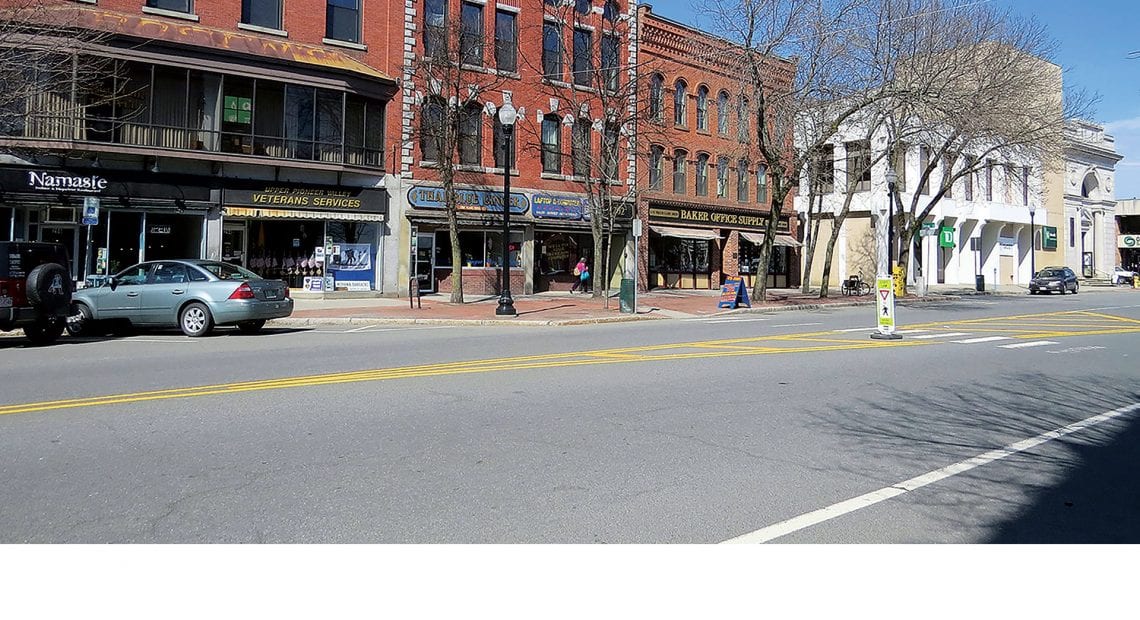View from Main Street

While economic activity is still slow, Diana Szynal says, she senses a resilient spirit in Franklin County.
Diana Szynal is encouraged by what she sees on Main Street in Greenfield as restaurants and retail continue to emerge from months of closed doors.
“I certainly see people making the changes they need to make,” she said, referring to Gov. Charlie Baker’s guidance for how — and at what capacity — to open businesses safely. “We’ve seen these business making the effort to reopen and get their staffs back to work and welcome back their customers.”
But no one is fooling themselves into believing everyone is ready to go out again, said Szynal, executive director of the Franklin County Chamber of Commerce.
“Certainly it seems like businesses are open — like restaurants with outdoor seating or limited indoor seating — and I think there are people really wanting to get out there, but some people aren’t ready yet,” she told BusinessWest.
“Realistically, things have slowed down, but I feel a very resilient spirit here,” she continued. “People in Franklin County are tough. And you see that not only in Greenfield’s downtown, but the area as a whole — downtown Deerfield, downtown Shelburne … I think you’re going to see them bounce back for sure.”
What will make the difference, she and other economic leaders increasingly say, is consumer confidence, which is being driven right now almost exclusively by health concerns — and that’s a good thing, considering that Massachusetts is one of the few states in the U.S. consistently reducing instances of COVID-19.
“For the typical consumer, making decisions about going out for the day or just going to a restaurant or retail shop, creating confidence is the key,” Szynal said. “And focusing on those [infection] numbers is really critical. That’s really how we’ll build confidence. Some people will take a little longer than others because they have different health concerns. But I think, if we can stay the course, we’ll be heading in the right direction economically as well as from a public-health standpoint.”
Associated Industries of Massachusetts (AIM) polls its 3,500 members each month to produce a Business Confidence Index that was firmly entrenched in positive territory for years — until it suffered the largest one-time decline in its history a couple months ago. However, it began to rebound slightly last month as Baker announced the four-phase process for re-opening the state economy under strict workplace-safety guidelines, and in the report due this week, it’s expected to creep up again amid positive news regarding infection rates.
“What makes this whole situation unique — and a little bit mystifying for employers — is that the economic situation is still being driven by a public-health situation,” said Chris Geehern, AIM’s executive vice president of Public Affairs and Communications. “Typically in an economic downturn, business people know exactly what to do. Now, it’s wholly dependent on what the daily numbers are from the state and nationally. I think that’s been a big challenge.”
“Certainly it seems like businesses are open — like restaurants with outdoor seating or limited indoor seating — and I think there are people really wanting to get out there, but some people aren’t ready yet.”
That said, he told BusinessWest, “our members have been satisfied with the state process. It has certainly been a challenge to meet all the requirements, but for most employers, the big issue isn’t what the government tells you to do, but what you know you have to do to ensure that employees, vendors, and customers feel comfortable coming in. It’s going to be a slow recovery whether the government requires these steps or not because people won’t come to your restaurant if you haven’t taken the appropriate safety steps.”
Growing Optimism
Employers hope a timely return to business will allow them to re-hire some of the 1.2 million Massachusetts residents who have filed for unemployment since the onset of the pandemic.
“From a broad perspective, I’m not getting a super pessimistic view from anyone I’ve spoken to,” Szynal said. “Certain people are concerned — they’ve had to make some changes, and they’ve had some struggles. People don’t expect those struggles to end instantly. But people are pretty optimistic for the long term.”
Again, that likely depends in part on the public-health data remaining on a positive track.
“Employers are encouraged that Massachusetts has been able to moderate the number of new COVID-19 cases. We have said all along that the current economic crisis is being driven by the public-health crisis, and that’s what we see here,” Raymond Torto, chair of AIM’s Board of Economic Advisors, noted in the latest business-confidence report.

Chris Geehern
“Typically in an economic downturn, business people know exactly what to do. Now, it’s wholly dependent on what the daily numbers are from the state and nationally. I think that’s been a big challenge.”
AIM President and CEO John Regan added that Baker’s deliberate, four-phase plan has so far been an effective way to reopen the state economy in a safe and efficient manner.
“We realize that every employer in Massachusetts would love to hear that they can reopen immediately. But we also acknowledge that a phased reopening balances the need to restart the economy with the need to manage a public-health crisis that continues to claim many lives a day in Massachusetts,” Regan said, adding that employers, “will in many cases need to reconfigure workplaces for social distancing and determine how to implement other safety measures, such as the wearing of protective equipment, continuing work-from-home policies, and ensuring the health of workers and customers.”
While AIM employers have been satisfied with the pace of the rollout, Geehern told BusinessWest, there was some frustration early on, particularly in the retail, restaurant, leisure, and hospitality sectors, which weren’t included in phase 1. “Some thought we should be moving faster. To be honest, I think the events going on down south persuaded most people that slow and safe is still the best way to do all this.”
He conceded that many AIM members are manufacturers, and they were able to return to work in phase 1 — and many were deemed essential workers from the start and never shut down operations. That partly explains why their business confidence has been slightly higher than non-manufacturers.
“They were, in fact, dealing with issues of workplace safety right along — processes like how to create six-feet separation, sanitize common areas, and monitor the health of people coming in,” he said. “This is something they’ve had a lot of experience with. For our group of manufacturers, it’s been a fairly smooth process.”
All Eyes on the Numbers
That said, Geehern noted that if COVID-19 cases began spiking and the governor paused or slowed the reopening, business confidence would clearly suffer.
“It’s still volatile and changeable, but I think it’s fair to say companies in general are satisfied with the pace of the rollout. Believe me, every employer in Massachusetts wishes Governor Baker could wave a magic wand and everything would go back to the way it was, but everyone knows that’s not the case.”
“The numbers are fairly optimistic, and I think the most important thing right now is confidence. That’s what’s going to help those businesses bounce back.”
How schools handle students’ return this fall — and what that does to the child-care picture — is a factor as well, he said. “There are a bunch of different elements to the whole picture. They’ll all eventually become clear.”
Part of that clarity is the sad reality that some businesses will be left behind. According to one AIM survey, slightly more than half of companies that furloughed employees will want them all to return when they’re able to bring them back, but some said they won’t be taking any of them back, because they’re planning on going out of business or running a skeleton staff for a while.
“It’s going to be a slow recovery, but our members still think the fundamentals of the economy that existed in February still exist, and I think that’s going to help us,” he noted, adding, however, that leisure and hospitality, as well as mom-and-pop shops of all kinds — two types of businesses that are important to the Franklin County economy — are especially vulnerable right now.
Knowing all of this — the tentatively good health news and the more uncertain economic outlook — Szynal chooses to take the glass-half-full view.
“The numbers are fairly optimistic, and I think the most important thing right now is confidence,” she said. “That’s what’s going to help those businesses bounce back.”
Joseph Bednar can be reached at [email protected]







